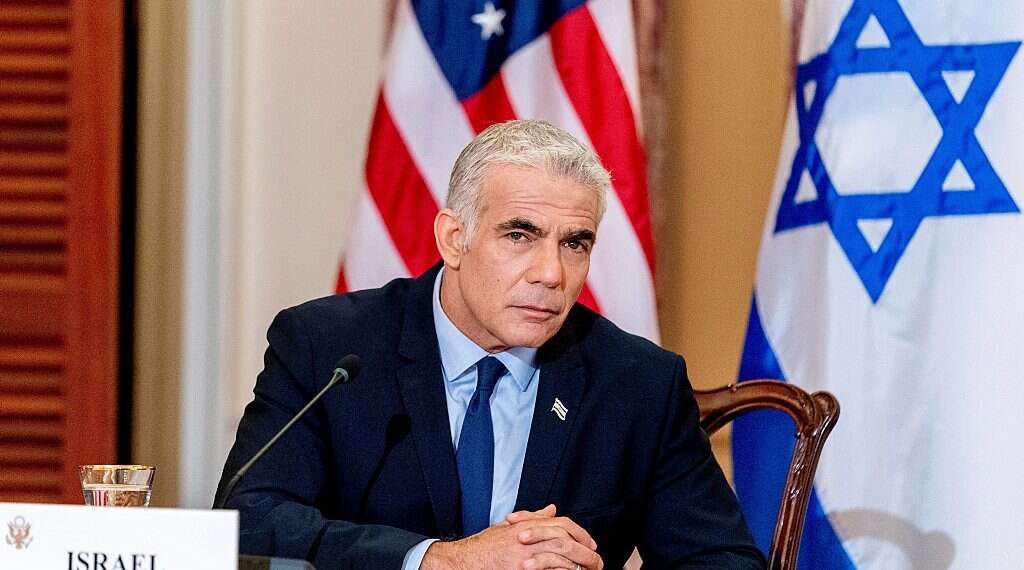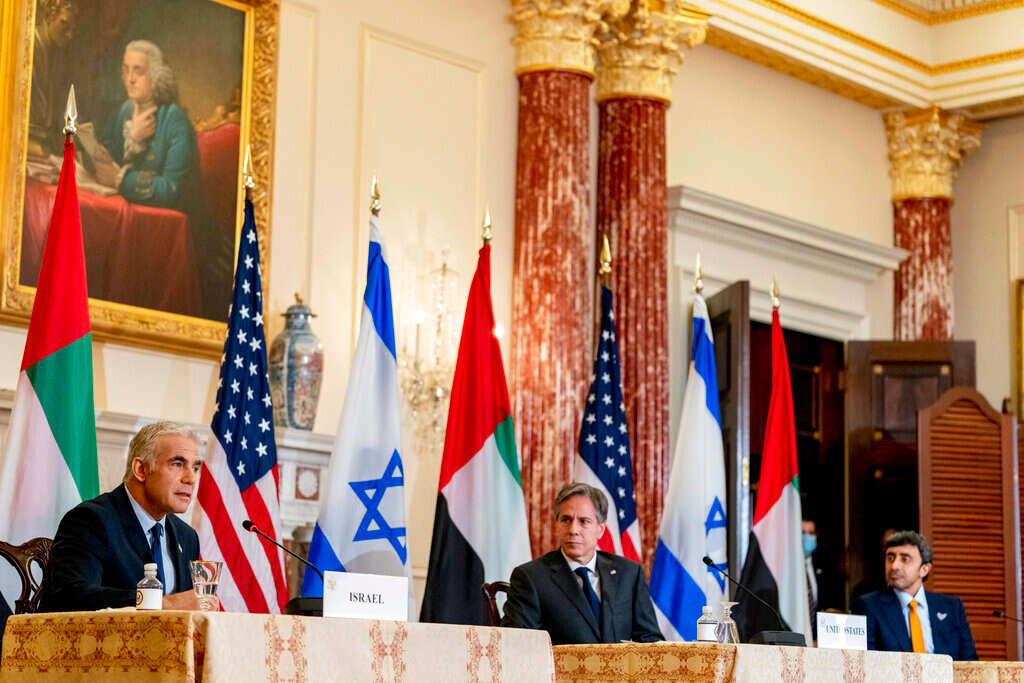by Ariel Kahana , Dmitriy Shapiro and News Agencies
"That is not only our right; it is also our responsibility. Iran has publicly stated it wants to wipe us out. We have no intention of letting this happen," Foreign Minister Yair Lapid says in joint press conference with US US Secretary of State Antony Blinken and United Arab Emirates Foreign Minister Sheikh Abdullah Bin Zayed Al Nahyan.
 |
Foreign Minister Yair Lapid at the State Department in Washington, Oct. 13, 2021 | Photo: Reuters.Andrew Harmik/Pool |
Israeli officials believe the Biden administration should set a timetable in regards to Iran and possible nuclear negotiations with the Islamic republic, Israel Hayom has learned. Additionally, Israeli officials believe the US must prepare an alternative plan if nuclear talks either aren't renewed or fail.
With that, in an effort to avoid tensions with the White House, which were rife during the Obama-Netanyahu years, Israeli officials have presented their position in a moderate manner. The Israeli echelon still believes that the US decision to renew nuclear talks with Iran is, in and of itself, a mistake, and not enough to eradicate the Iranian danger. However, senior Israeli officials have made it clear that the ongoing dialogue with the Biden administration is being conducted through a "mutual understanding that [the sides] agree on certain things and don't agree on others," with a desire not to emphasize the disagreements.
As part of this continuous discourse with the Biden administration, Foreign Minister Yair Lapid on Wednesday took part in a historic trilateral meeting with US Secretary of State Antony Blinken and United Arab Emirates Foreign Minister Sheikh Abdullah Bin Zayed Al Nahyan.

The three followed up the meeting with a joint press conference, seated three abreast in the State Department's Benjamin Franklin Room.
Blinken barely mentioned Iran during his opening remarks, but Lapid brought it into the conversation in his call for an alternative to the 2015 Iran nuclear deal, also known as the Joint Comprehensive Plan of Action (JCPOA), which may include the use of force.
"At the center of my visit here is the concern about Iran's race to nuclear capability," he said. "Iran is becoming a nuclear threshold country. Every day that passes, every delay in negotiations brings Iran closer to a nuclear bomb."
Israel, said Lapid, reserves the right to act on Iran at any given moment to prevent the Iranian regime from acquiring a nuclear weapon.
"There are moments when nations must use force to protect the world from evil," he said. "If a terror regime is going to acquire a nuclear weapon we must act. We must make clear that the civilized world won't allow it. If the Iranians don't believe the world is serious about stopping them, they will race to the bomb.
"Israel reserves the right to act at any given moment in any given way," Lapid said. Israel has previously bombed nuclear sites in Iraq and Syria.
"That is not only our right; it is also our responsibility," he added. "Iran has publicly stated it wants to wipe us out. We have no intention of letting this happen."
Blinken addressed Iran when asked by reporters, setting low expectations as to whether there will be any concrete action into re-entering the JCPOA as many expect another round of indirect negotiations later this month.
He said while all three leaders believe that Iran cannot be allowed to acquire a nuclear weapon, the United States favors a diplomatic pathway. Yet he sounded less confident about whether or not Iran was willing to cooperate.
"But as we've had occasion to discuss in recent weeks, despite the fact that we've made abundantly clear over the last nine months that we are prepared to return to full compliance with the JCPOA if Iran does the same, what we are seeing – or maybe more accurately not seeing from Tehran now – suggests that they're not," said the secretary of state. "And time is running short because, as we've also had an opportunity to discuss together, we are getting closer to a point at which returning to compliance with the JCPOA will not in and of itself recapture the benefits of the JCPOA, and that's because Iran has been using this time to advance its nuclear program in a variety of ways, including enriching uranium to 20% and even 60%, using more advanced centrifuges, acquiring more knowledge. And so that runway is getting shorter."
Blinken said that the allies are looking at "other options" of what to do if Iran does not rejoin negotiations, while never going as far to acknowledge that other options could be military ones.
"I would like to start by repeating what the secretary of state just said," stated Lapid. "Yes, other options are going to be on the table if diplomacy fails. And by saying other options, I think everybody understands here, in Israel, in the Emirates and in Tehran what it is that we mean."
The European Union coordinator on Iran, Enrique Mora, planned to visit Tehran on Thursday, a trip that diplomats from Britain, France and Germany, a group known as the E3, said came at a critical time.
"The nuclear situation has worsened continuously and seriously," said one E3 diplomat, alluding to Iran's accelerating enrichment of uranium to higher fissile purity, a possible pathway to a nuclear bomb.
"This therefore is from our E3 point of view not a 'business as usual' but a visit in [the] context of a deep crisis in the JCPOA," the diplomat added.
While officials have made similar past statements, taken together the comments suggested a more coercive rhetorical stance toward Tehran if it refused to resume compliance with the deal called the Joint Comprehensive Plan of Action (JCPOA).
Earlier, the US special envoy for Iran, Rob Malley, said Washington was ready to consider "all options" if Iran is unwilling to return to the 2015 deal, which was negotiated under then-President Barack Obama and then-Vice President Joe Biden, who is now the US president.
The phrase "all options," is typically intended to include the possibility – however remote – of military action.
Some analysts, however, read the comments less as a tougher stance on Iran and more as a reflection of the uncertainty about whether the Ebrahim Raisi government will return to talks and, even if it does, whether it will agree to revive the deal.
The State Department said Malley would travel to the United Arab Emirates, Qatar and Saudi Arabia from Oct. 15-21 to coordinate with Gulf allies.
"We will be prepared to adjust to a different reality in which we have to deal with all options to address Iran's nuclear program if it's not prepared to come back into the constraints," Malley said in a virtual appearance at a Washington think tank.
"There is every possibility that Iran will choose a different path, and we need to coordinate with Israel and other partners in the region," he added.
"I will be traveling to Saudi Arabia, UAE and Qatar in just a matter of days to talk about efforts to come back to (JCPOA) and what options we have to control Iran's nuclear program if we can't achieve that goal."
Blinken began the press conference by touting the accomplishments between the two nations, who were two of the first signees of the US-brokered Abraham Accords, signed on the White House lawn on Sept. 15, 2020.
"The UAE-Israel relationship has, I think it's fair to say, flourished this past year," said Blinken. "This May, Israel opened an embassy in the UAE – the first it has ever had to a Gulf nation. And a few days ago, Israel's new ambassador to the UAE presented his credentials. In July, the UAE opened an embassy in Israel, the first Gulf state to take that action."
Blinken said the Biden administration strongly supports developing relationships between the nations that joined the agreement – Bahrain, Sudan and Morocco as well – and looks to expand the circle of countries normalizing relations with Israel in the years ahead.
"We believe that normalization can and should be a force for progress, not only between Israel and Arab countries and other countries in the region and beyond but between Israelis and Palestinians," he said. "As [US] President [Joe] Biden has said, Israelis and Palestinians equally deserve to live safely and securely and to enjoy equal measures of freedom, prosperity, democracy. The president has also been clear that a two-state solution is the best way to ensure Israel's future as a Jewish and democratic state, living in peace alongside a viable, sovereign, and democratic Palestinian state."
'I'm going to visit soon to meet a friend, but also a partner'
Two new trilateral working groups were launched during the meeting, according to Blinken, with the first group to focus on religious coexistence.
"This is a moment of rising antisemitism, rising Islamophobia, and we want Israel, the United Arab Emirates and the United States to work together to build tolerance and ensure that all religious groups can worship in their traditional ways without violence, without intimidation, without discrimination," said Blinken.
The second working group will focus on water and energy, which Blinken said are critical for all three countries in the face of climate change. He said he was pleased that Israel had joined the Agriculture Innovation Mission for Climate – a joint initiative between the United States and UAE to "catalyze new investment in climate-smart agriculture," with Israeli and Emirati companies already planning collaborations on renewable projects.
Both the UAE and Israel have made pledges to cut down emissions by 2050 – Israel by 85% and the UAE aims to reach net-zero emissions.
Lapid and Al Nahyan were optimistic about the accords and their relationship, calling each other friends. When asked by a reporter about when he'll visit Israel, Al Nahyan replied that Lapid had invited him to do so during their meeting.
"Foreign Minister Yair was kind enough to invite me to visit Israel, and I'm going to visit soon to meet a friend but also a partner," said Al Nahyan. "We need to not only celebrate this relationship but look at new avenues of cooperation."
"I look forward to seeing you in Israel soon," he said to Lapid.
Lapid responded: "In Israel, the door is open to you. My wife is looking forward to having you over for dinner.
"His Highness Sheikh Abdullah and I have become friends and partners. Our friendship is based on shared values, on moderation, on religious tolerance, on the importance of fighting terror and radicalization," said Lapid. "The partnership is based on economics, progress and technological excellence. This partnership isn't just between Jews and Arabs, but between citizens of the world who want to be partners in the fight against climate change, against poverty, against the pandemic that has taken the lives of millions."
US Deputy Secretary Wendy Sherman also met with Foreign Ministry Director-General Alon Ushpiz, where the two covered largely the same subjects as Lapid and Blinken.
JNS.org. contributed to this report.
Ariel Kahana , Dmitriy Shapiro and News Agencies
Source: https://www.israelhayom.com/2021/10/14/fm-lapid-israel-reserves-right-to-against-iran-at-any-time-in-any-way/
No comments:
Post a Comment